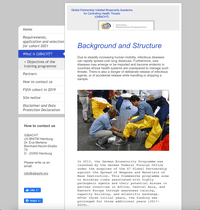Global Partnership Initiated Biosecurity Academia for Controlling Health Threats
[GIBACHT]
GIBACHT is a year-long biosafety and biosecurity fellowship for public health professionals in Africa, the Middle East, South Asia, and Central Asia. There have been 109 fellows from 26 countries across 7 cohorts. The program follows a blended learning approach, including eLearning modules, distance-based group work and three one-week workshops.
SUMMARY
The Global Partnership Initiated Biosecurity Academia for Controlling Health Threats (GIBACHT) is a year-long biosafety and biosecurity fellowship for public health professionals in Africa, the Middle East, South Asia, and Central Asia. GIBACHT is coordinated by the Bernhard Nocht Institute for Tropical Medicine (BNITM) and conducted in partnership with the Robert Koch Institute (RKI), the Swiss Tropical and Public Health Institute (Swiss TPH), and the African Field Epidemiology Network (AFENET). There have been 109 fellows from 26 countries across 7 cohorts. The program follows a blended learning approach, including eLearning modules, distance-based group work and three one-week workshops. Participants also actively participate in a case study development process and conduct a Scientific Exchange training at their home institution. The fellowship takes place in English, and participants must demonstrate their English proficiency during the application process.
The German Biosecurity Programme (GBP) was launched in 2013 by the German Federal Foreign Office in order to implement sustainable biosafety and biosecurity projects in various countries under the auspices of the G7 Global Partnership against the Spread of Weapons and Materials of Mass Destruction, and to strengthen the Biological Weapons Convention (BWC). The GBP is currently active in nine countries as well as with two supraregional projects, with projects focusing on reducing biological threats and strengthening the health capacities of partner countries in Africa, Central Asia and Eastern Europe, thus enhancing their national security. Their projects tackle six main areas: 1. awareness raising, 2. biosafety and biosecurity, 3. surveillance, 4. detection and diagnostics, 5. networking, and 6. capacity development.


..png)
